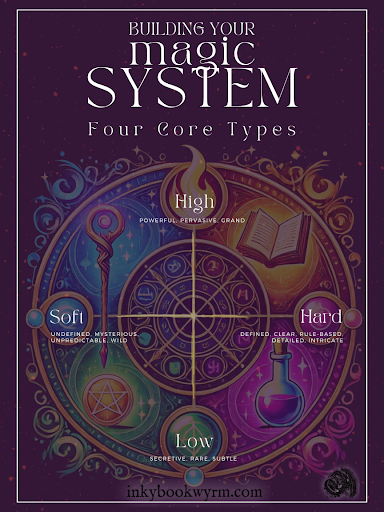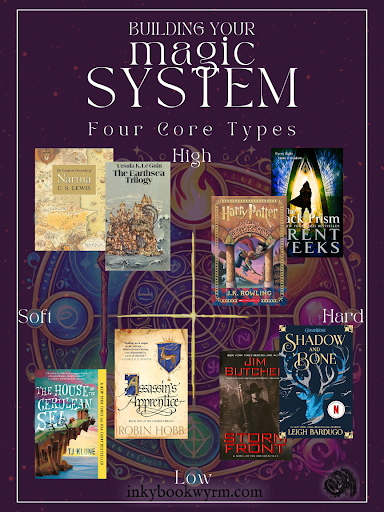How to Build a Magic System That Serves Your Story (Instead of Distracting from It)
When writing a fantasy novel, it’s easy to get caught up in the cool factor of it all—enchanted objects, secret portals, forbidden spells, talking dragons. And listen, I love all of it. But here’s the thing a lot of writers miss: your magic system isn’t just a shiny layer on top of your story. It should serve the story.
That’s exactly what I got into with this week’s Write It Scared podcast guest, Gina Kammer. Gina is a book coach and developmental editor who specializes in fantasy and science fiction. She also happens to be a brain science nerd who understands how stories actually work on a neurological level (which is as amazing as it sounds).
Here are some of the biggest takeaways from our conversation, and why understanding how to build a purposeful magic system might be the key to unlocking your fantasy novel.
Magic Isn’t the Point—The Story Is
Gina describes a magic system as “the set of rules, limitations, and abilities that define the supernatural forces in your world.” But if those powers don’t reflect your protagonist’s internal arc, it can start to feel like noise.
For example: In The Lord of the Rings, Frodo’s fear of corruption is mirrored by the Ring’s power. Every time he uses it, he gets closer to losing himself. That’s not just good worldbuilding—it’s character-driven storytelling.
So when you're brainstorming your system, ask:
How does this magic support the theme?
The character's arc?
The emotional heart of the story?
Use Brain Science to Create Reader Enchantment
Gina’s got this framework she calls The Three Keys to Reader Enchantment:
Expectation – Readers want certain structures and turning points. It’s how we’re wired.
Enlightenment – The story should reveal something meaningful, help us make sense of the world.
Experience – Stories work best when they tap into our emotional memories. That’s what creates immersion.
Your fantasy world can be as wild as you want, but it still needs to honor how humans process story. That’s how you cast a spell that readers don’t want to break.
The Magical Quadrant: A Tool to Keep You Sane
If you’re overwhelmed by all the different directions your magic system could go, Gina’s quadrant tool is a lifesaver. Here’s the gist:
Magic systems exist on two spectrums:
Soft ➝ Hard: How well-defined the rules are (think Narnia vs. Mistborn)
Low ➝ High: How common and powerful the magic is (think Game of Thrones vs. Harry Potter)
Your story doesn’t have to be perfectly plotted on a grid, but this framework can help you get clear on what kind of magic system best supports the tone, theme, and scope of your story.
Want to see it in action? Gina has a great blog post with a visual breakdown of this quadrant (I’ve linked it for you in the notes below).
Images courtesy of Gina Kammer, at the Inkybookwrym.com
Why Magic Systems Make Writers Spiral—and What to Do About It
Let’s be honest. It’s not just about the rules or the world. Sometimes we go down the magic system rabbit hole because we’re scared. Scared no one will care about this weird little world we’re building. Scared it’s all a waste of time.
That fear can show up as endless research. Or stalling. Or worldbuilding spreadsheets instead of writing scenes.
Here’s what Gina had to say:
“Getting other eyes on your work is the very thing that helps the most.”
Whether it’s a critique partner, a writing group, or a professional coach, sharing your work and getting the proper feedback is how you move forward. (And yes, it’s scary. Do it anyway. You’ve got this.)
Busting the Myth of Originality
One of my favorite moments in our conversation was when Gina said this:
“We can stop trying so hard to do something that’s never been done before. Rather, we can focus on what really supports the story we’re trying to tell.”
I don’t know who needs to hear this today, but you don’t have to be wildly original. You just have to be honest. You have to be you. That’s what makes your story enough.
Final Takeaway: No Words Are Wasted
Writing fantasy (or anything, really) is an iterative process. It’s layer upon layer. Nothing is lost, even the stuff you cut or rewrite or reimagine. It all helps you get to the next version of your story.
A better version.
As one of Gina’s clients said, “I’m not spiraling—I’m leveling up in layers.”
And that, my friend, is the magic.
Want more from Gina?
Check out her YouTube channel
Visit her site: inkybookwyrm.com
Or get her Magic System Quadrant resource
Plus, fantasy and sci-fi writers can join her Critique Partner Program (50% off through this link!)
And don’t forget—our Podcast Anniversary Giveaway is live! I’m giving away THREE 90-minute plot strategy sessions. Enter at writeitscared.co/podcastanniversarygiveaway by June 11th.
Now go write something messy and brave, and remember—writing a novel is an inside job we don’t do alone!




